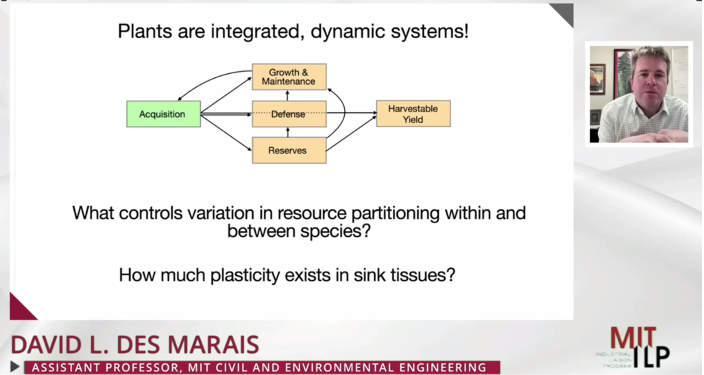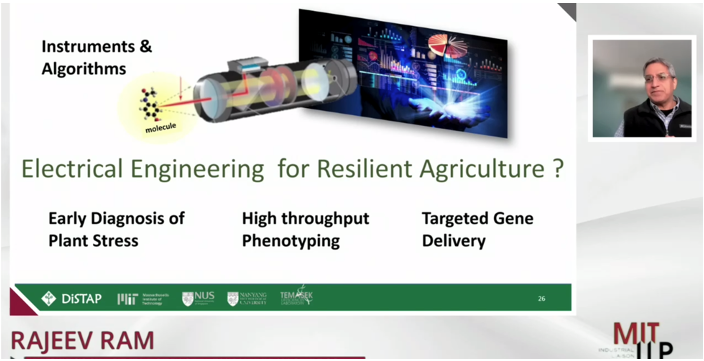News J-WAFS researchers participate in ILP’s 2023 AgTech Webinar
Dave Des Marais and Rajeev Ram shared insights into recent research on improving crops in the face of climate change.
Maria Paula Acosta April 5, 2023
On March 16, 2023, MIT’s Industrial Liaison Program (ILP) hosted an AgTech webinar featuring research, trends, and advances in biological engineering and sensing with agricultural applications. The webinar focused on two research efforts involving plant genomics and the detection of plant stress, a growing concern in the context of climate change. MIT experts, including J-WAFS principal investigators (PIs) Dave Des Marais and Rajeev Ram, presented their research. J-WAFS director, John H. Lienhard, also took part by offering an overview of J-WAFS programming and events.

Dave Des Marais, the Cecil & Ida Green Career Development Professor and an assistant professor in the Department of Civil and Environmental Engineering, presented his work on the mechanisms of plant-environment interactions. He is trying to boost food security by predicting plant responses to climate change and identifying possible crop improvements for greater ecological resilience. While CO2 in the atmosphere is a driver of climate change, plants need CO2 to survive. Des Marais explained how plants use solar energy to power the conversion of atmospheric CO2 into stable sugars, which are then used by the plant for growth and seed production. He is researching how the anthropogenic rise of CO2 in the atmosphere affects three fundamental plant processes – growth, metabolism, and reproduction. His lab grew three different types of plant species and exposed them to increasing levels of CO2. The results were that all three species increased carbon assimilation with increased CO2, but only one of them exploited the extra fixed carbon to increase its growth rate; the two species that did not experience increased growth rate accumulated carbohydrates in their leaves. This latter result could be beneficial for leafy crops with leaves that provide food for humans, such as salad greens. Des Marais mentioned that further studies are called for, and information must be disseminated to farmers.

Rajeev Ram, a professor in the Electrical Engineering and Computer Science Department, introduced and described his work with photonic tools to rapidly and non-invasively detect biotic and abiotic stresses in plants. He is collaborating with other J-WAFS PIs Benedetto Marelli , Chris Voigt, and Michael Strano, as well as the Temasek Life Sciences Laboratory (TLL) in Singapore. Ram explained how electrical engineering is being applied in the field of agriculture technology and how the two seemingly divergent areas can be beneficially combined. His interdisciplinary team, for example, is working to build better diagnostic tools to analyze plant health. One such tool is called Raman spectroscopy, which uses a laser to look at plant leaves to learn specific information like nitrate concentration or cellulose and starch levels. By extracting this data early enough in the life of the plant, researchers, and eventually farmers, can respond when a plant is deficient in certain nutrients. Ram says that what motivates him to work in this space is the fact “that there are changes in agricultural productivity that are required to provide the calories that we need for an increasing population and improved standard of living.”
Lastly, J-WAFS director John H. Lienhard, who is also a professor in the Department of Mechanical Engineering, gave an overarching introduction to the work done by J-WAFS “to touch the world around us” through building more resilient water and food systems. He described the funding opportunities available through J-WAFS and highlighted exciting research coming out of the lab, including ways to engineer crops that don’t need ammonia fertilizer and projects in the developing world to remove arsenic from the water supply.